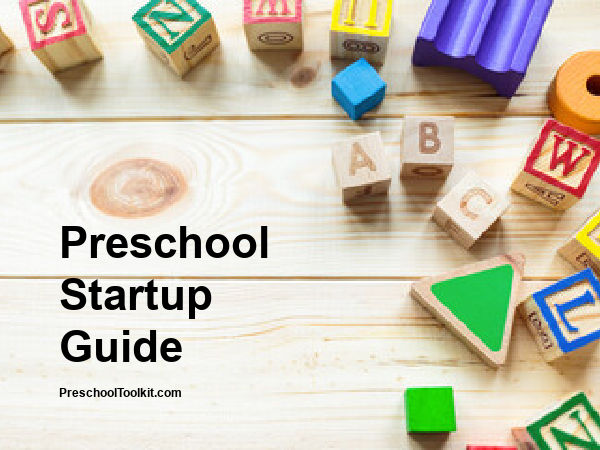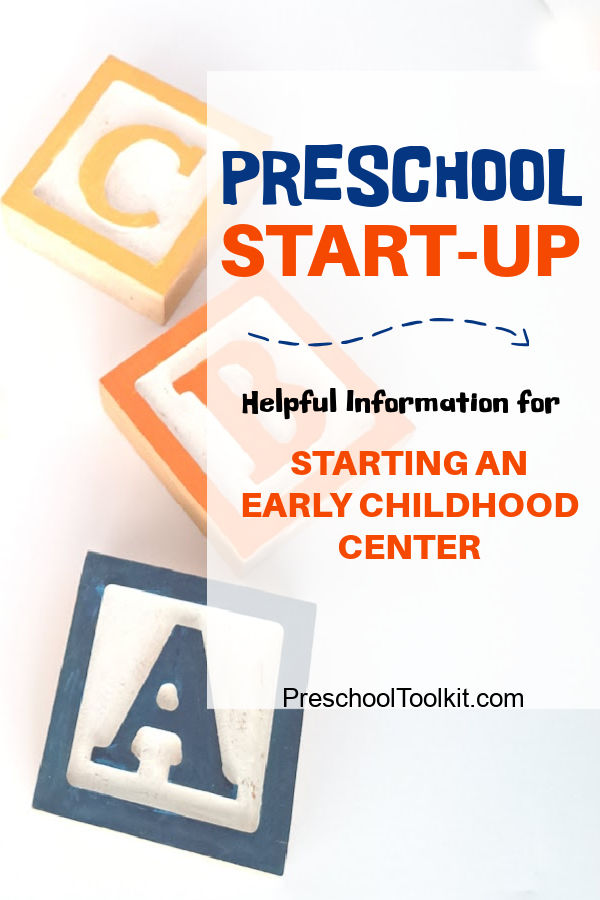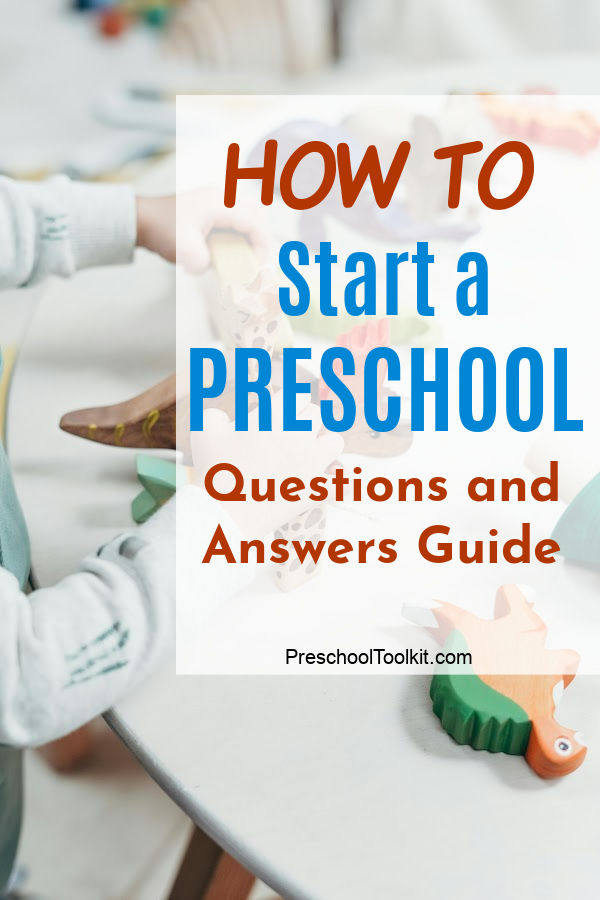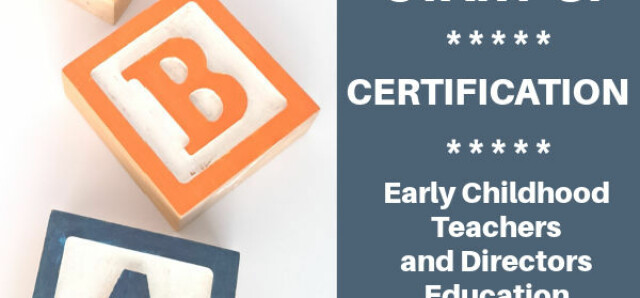Tips for Starting a Preschool Facility
This guide shares information for starting a licensed preschool program for children aged three to five. The information can be helpful for anyone considering a career in early childhood education, as a facility owner, teacher or director.

Privacy and Disclosure for information on cookies and affiliates
Imagine a group of preschoolers busily playing together in an early learning environment.
- One or two children are pouring water through funnels at the water table.
- A few kids are building towers in the block corner.
- Someone is arranging a table setting in the dramatic play area.
- Another preschooler is painting at an art easel nearby.
Can you envision yourself in this setting? If so, I'm pleased to share information that can start you on your journey to early childhood educator as a facility owner, teacher, director, or a combination of these roles.
This guide talks about requirements for opening an early learning center. While the information is written from my experience as a preschool owner, anyone considering a career in early childhood will find the information useful.
The content in this guide is not authoritative or binding.
- This guide does not profess to be all inclusive, nor am I an authority on the subject. My goal is to provide some insight into what to expect with a career in early childhood by sharing my experience as a self-employed owner of a preschool facility, and teacher to small groups of children aged three to five.
I was fortunate to have a career as operator of my own preschool facility. Self-employment is, understandably, not a career choice for everyone, but it does provide unique opportunities.
- For example, if you operate from your home, you may have your own children to include in the enrollment. You may find it convenient to operate your preschool start-up in a way that accommodates their needs and schedules in conjunction with your teaching day.
The information in this guide can help you explore a career in ECE (Early Childhood Education) and the journey to starting your own center. Enjoy reading this guide and planning your career!
Helpful information for starting a preschool
__________________________________
Table of Contents
__________________________________
|
For the purpose of this guide, I reference documents pertaining to my province of Nova Scotia, Canada. Where I provide links that take you to documents or articles on other websites to further illustrate certain topics, visits to these sites are the responsibility of the reader. |
This article discusses topics relevant to opening an early childhood facility, including starter costs and operating expenses, education requirements for preschool teachers and business owners, and program development that complies with license regulations.
As a facility owner, your have multiple responsibilities. Ownership gives you control over the day to day operation, such as setting open hours and choosing play activities. But you are also responsible for the many facets of the business that ensure its smooth operation: maintenance; staffing; finances.
I hope this discussion shed some light on the various aspects of running an early childhood facility, and assists you in your goal of starting your own preschool center.
1. License Regulations
Regulations for child care facilities may vary from region to region, within a state, province, or country. Different requirements may be mandated for licensed and unlicensed facilities, and for training and certification levels of teachers and directors. Some government regulations will be mandatory, while others are considered standard or advisable.
Understanding the licensing regulations you will encounter is a good first step toward opening a facility. Licensing officers can offer valuable information and advice on the many facets of starting a preschool.
This article provides some insight into regulations that govern an early childhood facility in my area.
You can inquire through your government, or an established child care facility in your area, for information on regulations specific to your location.
2. Education Requirements

Certification is a requirement to become an early childhood educator. Costs for a degree or diploma in Early Childhood Education (ECE) may vary from institution to institution.
This article about certification will help distinguish the role requirements for early childhood teachers and directors, and training options (with a look at course content), to achieve these employment possibilities.
The level of education you achieve, and resulting expense for the course(s), will also depend on the employment role you have in mind.
- For example, a director of a facility may require different credentials than a classroom preschool teacher.
Training and experience will go a long way to helping you find success as a business owner. While this guide does not offer insight into a business education, it's understandable that business knowledge is advantageous at any level, whether owner, manager, or director of a facility.
3. Starter Costs

If you are looking forward to opening an early childhood center, you'll be entering a profession with many layers. On a daily basis, duties for an owner or director can range from bookkeeping and program planning to teaching preschoolers and cleaning classrooms.
All these tasks, and more, take time and, of course, money. Understanding money matters is of primary importance. For entrepreneurs, this will include the necessity of getting your finances in order before you begin your enterprise.
| Disclaimer: I am not an authority on the subject of finance for a preschool start-up or any other business. In this discussion I share my experience as a facility owner and teacher. Finances are a personal topic and will be handled differently by each individual. Access professional assistance for further financial clarification and insight. |
Government funding may be available for small business owners - and the child care sector specifically - at local levels as well as federal or national levels. Give some consideration to all options available to you to help with financing your preschool start-up.
The structure or environment that houses your preschool will be the first determining factor of starter costs. Choosing a location may be a major capital expenditure, especially if it is outside a home-based option.
Capital expenditures may include renting or buying a facility, and renovations and furnishings for a public space as well as a home-based environment.
Establishing a preschool space is an important part of your journey, as it will help determine your initial expenses and anticipated monthly costs.
-
Furnishings and Toys

You will need to outfit the space with both regular and kid-sized furniture as well as age-appropriate toys and teaching materials.
Look for ways to reduce initial costs for furnishings, toys, and craft supplies.
- Find lightly used toys and furnishings at yard sales.
- Purchase craft supplies at a dollar store.
- Access “freebies” from local businesses: scrap paper from a stationary store; carpet ends from a flooring store.
- Set up a toy exchange with neighboring child care centers.
- Search for kid-size furnishings (tables and chairs) on social media or local market exchanges.
4. Operating Expenses
Preschool owners often wear many hats, including teacher, administrator, maintenance person and bookkeeper. The overall expense for you as an entrepreneur will be determined in part by how many tasks you undertake, and how many you outsource.
Initial costs will vary from person to person. You will need funds up front to cover: payroll; maintenance; craft supplies; menu items, and be prepared to meet monthly expenditures
Expenses for your facility may include the following.
- Rent or mortgage payment
- Utilities: Heat, water, power
- Maintenance
- Insurance
- Taxes
- Payroll
- Cleaning supplies
- Teaching supplies
- Renovations
Major expenses such as rent, utilities and insurance are often paid monthly or yearly, and some will require the first month in advance. Other items such as cleaning supplies and craft supplies will be purchased as needed.
A budget will take these and other expenses into account based on anticipated daily expenditures as well as forecasted operation of the business. It includes number of days the facility will be open; training upgrades anticipated for teachers and staff; cost of curriculum materials.
5. Program

Naturally, program development is an integral part of your preschool startup. A quality program is necessary to establish your facility as a valued early learning center.
This article has more detailed tips for developing an early learning program.
The program you develop will be influenced in part by your choice of curriculum, and your personal and professional goals. Recognizing your goals will help determine your business model.
The following examples illustrate how your goals will shape the program you hope to deliver to your students.
Will you offer part-day or full-day programs?
- A license for a full-day program may require a fenced outdoor play area and approved play equipment.
Will you be including naps and meals in your schedule?
- Determine whether you need rest mats in separate quarters; mid-morning snacks or full menus.
Will you be working alone or hiring staff?
- Additional insurance as well as additional staff may be required for field trips away from the center.
Other considerations
You may want to invest in an electronic billing service, and an online presence, complete with a website and social media platforms that require development and maintenance.
7. Administration
Bookkeeping
Every business, including a licensed preschool facility, will have a certain amount of record keeping. For preschool owners, this will include maintaining client registration information and health records, as well as statements of income and disbursements which must be maintained for accurate income tax reporting.
If you choose to enlist some or all bookkeeping duties to outside accounting services, this will be an added expense for your business.
With or without professional assistance, a basic course in bookkeeping will help you as a facility owner or manager to understand record keeping and financial transactions. Recognize your comfort level and set appropriate mechanisms in place early in your journey.
Entrance Fee
One of the first steps to getting your business started will be setting a registration fee.
The entrance fee will be a balance of obtaining the income you hope for at a reasonable cost to prospective clients.
This cost may be based on the current trend for pricing at similar schools in your area. While you'll want fees to be in line with other schools or programs, you'll also want to be paid appropriately for your work, based on your credentials and the program you deliver.
Preparing a budget will help you weigh income and expenses - income from enrollment vs cost to provide the program.
Tips for setting up a preschool

Starting your own preschool presents unique challenges, especially if you will be the sole owner/teacher.
I hope this guide answers some questions about starting a preschool, and inspires you to ask more!
It's advantageous to equip yourself with information from many different sources.
Your decisions will be influenced both by the requirements for obtaining certification in Early Childhood Education, as well as the business model you develop for your early learning facility.
Networking with others is a valuable tool. If possible, make contact with entrepreneurs and directors in the field early on. They can share specific information about their experiences.
The knowledge and care you bring to your venture will ensure positive experiences for your clients. You can look forward to starting a preschool that delivers a quality program in a safe and nurturing environment.


FACEBOOK PINTEREST INSTAGRAM YOUTUBE


